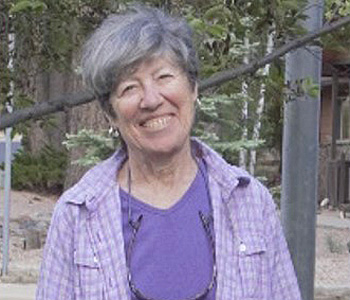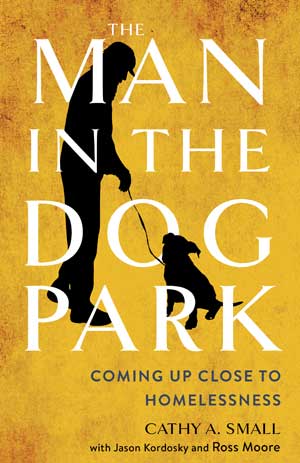
The Man in the Dog Park describes the experience of homelessness from a homeless point of view. Co-authored with a homeless man, the book is based on scores of interviews and encounters with individuals without homes; its chapters lead the reader into a world that most have never seen.
The reader travels as an intimate observer in this world. What is unique about the book is what a reader is able to witness: the details of a day at a homeless shelter; what happens to you on a “day labor” job; a trip to a pawn shop to exchange a ring for needed money, and what you really get and owe. Readers spend time with a panhandler, as he shows us how he negotiates living in his car; they hear the interview questions asked at the federal housing office, when my co-author Ross is trying to qualify for shelter. Privy to more than just homelessness statistics or even to interview narratives, readers will encounter the realities and issues of homelessness as they are lived.
Each of the book’s central chapters focuses on a slice of homeless life: the stigma felt by those without homes (3), shelter life (4), street life (5), making money (6), negotiating the bureaucracy (7). But these chapters are framed by a larger argument: that none of the realities of homeless life happens apart from “us.” As described on the Cornell University Press website: “The Man in the Dog Park points to the ways that our own cultural assumptions and blind spots are complicit in US homelessness and contribute to the degree of suffering that homeless people face. At the same time, Small, Kordosky and Moore show us how our own sense of connection and compassion can bring us into touch with the actions that will lessen homelessness and bring greater humanity to the experience of those who remain homeless.” To see Small and Moore discussing their book see this video on YouTube.
I would want the reader to read this in whatever way that invites their attention and their compassion. Although this will differ for different readers, a few members of diverse book clubs have offered me this advice:
One reader: “Read in small chunks, maybe 2-3 chapters only at a time. When you truly take in the material, sometimes the enormity of suffering or frustration there can be overwhelming. A shorter, slower, “read and process” strategy can be useful for balance.”
Another reader: “Try to note and relax your own judgments. This applies not only to viewing people who are homeless but also to yourself. There is a lot you may not have noticed or known. Join the club.”
Ignorance, delusion, indifference. It is these qualities, I have found in myself too, that undergird the writing of this book, so please appreciate your own willingness to engage with painful places that can all too easily be ignored.
This book offers intimate, personal stories, but they are connected to a wider trajectory of our country over the last sixty years. My own coming of age in the 1960s occurred in a climate of both protest and optimism. Ushered in by the War on Poverty and a vibrant Civil Rights movement, there was a sense that the racial and economic disparities in our country might finally and truly begin to dissipate.
In the years since then a curiously different reality has emerged. How could it be that despite decades of programs to alleviate poverty the results have been an increase in the disparity between rich and poor?
This is true whether you compare the gap between worker and executive compensation, or the proportion of wealth held by the bottom versus top economic quintiles, or the relative buying power of differing income groups over time. The rich are richer; the poor are poorer; and the middle class is smaller. And these statistics insidiously intersect with gender and race.
In The Economist’s Hour, published in 2019, Binyamin Appelbaum argues that this is because the real target of government programs has been market and corporate growth, rooted in the belief that all Americans will share in the benefits of market profits. But they haven’t. Our stories of homelessness are the casualties of this belief, a heart-wrenching piece of collateral damage from the national path we are on.
***
Anthropologists are always crossing worlds and, in some sense, entering the world of “people without homes” is a natural extension of my professional path. In the early 1980s, I studied “globalization” through the lens of a village the Kingdom of Tonga (South Pacific), where I lived for three years. My experience there forever upended my own sense of the world, and of the United States. It sparked my belief that a central purpose of anthropology is to show you your own blind spots.
Later in my career, out of the feeling that I no longer could understand or enjoy teaching undergraduate students, I enrolled in my own university as a freshman. I moved out of my home and into an undergraduate dormitory, spending an entire year taking classes that were out of my subject area. (I was only a B student.) It transformed my perspective and my teaching.
But I had no professional intentions of broaching the topic of homelessness. This was not any area of focus or expertise for me, nor an issue I gave much thought. I just met this man—the man in the dog park—and we let each other into our respective lives.
Sometimes, it is this way—that a personal path guides the professional. As a committed and long-term Buddhist meditator, it tugged at me how my initial fear (see question #3) cut off my connection and compassion for this homeless man. As I made an effort to track my own gaze, to notice him, to see his plight, I started to care: Where is he getting hot food on these cold nights? Was he really sleeping outside—where? How did he get a shower? Or medical care? Why was he working temp labor when a real job paid more?
I started asking more. He started talking more. I became progressively drawn into the life that he and others were living. Five years after we first met, I finally asked him the question: Do you want to write a book together? His response: “You’re crazier than I am.” But then we wrote the book anyhow.
There are so many encounters, described in the book, which continue to affect me. Maybe the reader would stumble on one of them and see its poignancy.
A strapping, homeless, youth walks with me (a 5’ 2”, 112 lb., female senior citizen) in an upscale neighborhood and turns to exclaim: “I feel so safe with you!” (He likes to look at people’s gardens and homes and feels that, without me there, residents would call the police).
A homeless day-laborer, working a back-breaking 10-hour construction job, is worried only that the other men on the crew will see he has no lunch when it is time to eat.
A 44-year-old woman sneaks each night into the 10×10 storage unit she rents, because her minimum wage salary is not enough for an apartment in her town.
These are just a few of the people whom readers might meet.
Probably, though, I would most want browsers to begin at the beginning. There (in the preface and the first pages of the introduction) they would see where I personally started with this: afraid of a homeless man I encountered one early morning when I came alone with my dog to a secluded dog park. And I would add: Completely unaware that anyone of the people in the stories above lived the lives they did.
From these initial pages, browsers would also get a sense of where one can go in crossing the boundaries into another world, at least, what it offered me: “not only a greater responsiveness to the human condition but also the delight of living in a world less alien, less hostile, less unloving than it felt before” (Preface, viii).
In the opening paragraph of the preface, it reads: “Compassion is described as the quivering of the heart in relation to the suffering of others; it is accompanied by an impulse to relieve the suffering witnessed.” I would hope that the book leads readers to a greater understanding of the suffering that homeless people endure and a greater impulse to relieve that suffering.
A study from the Center for Experimental Research on Fairness, Inequality and Rationality at the Norwegian School of Economics found that people in all political camps—conservative and liberal—want to take corrective measures about inequality when they perceive that being disadvantaged is not “earned.”
I wish that the book can offer readers another way to talk about causation, one that focuses more on the impossibly slippery slope on which people teeter before sliding into homelessness rather than focusing on their choice of footwear. I hope readers will come to see the patience and ingenuity it really takes to live homeless. I imagine they will wince, with me, at the indignities of living with the stigma of homelessness. I wish that the book will bring to light the unseen features of being poor and homeless: the businesses that profit from the poor; the countless hoops and catch-22s in the bureaucracies purporting to help the homeless.
I hope insights will prompt some action, although our book is not prescriptive about the changes we expect. I take heart in whatever a reader might be moved to do. Given our different proclivities and resources and positions, this may vary widely. I was moved to volunteer at a homeless shelter (and write a book!) but others might send donations. Perhaps the action taken will be to put issues on one’s radar, like decriminalizing overnight camping or regulating payday loans, that hadn’t been there before. Maybe a neighborhood or a church group might take on the biggest obstacle to affordable housing in their community: NIMBY (attitudes deeming housing as important but Not in My Backyard).
I dream that those in positions of power might help rouse the political will to squarely address homelessness, and the social and economic inequities at its source. But the most real and tender image I hold is that of multiple readers, some of whom have written me, who carry little bags of snacks in their cars, with maybe a pair of socks, or a toothbrush, or a bus pass, to hand out to homeless people they encounter.


Cathy Small is Professor Emeritus of Anthropology at Northern Arizona University, where she taught cultural anthropology and served as Graduate Coordinator. Her ethnographic work, including three books, has focused on globalization and social change, on U.S. education, and, more recently, on homelessness. She is a National Science Foundation supported scholar for her work in the computer modeling of social systems and a recipient of the national Praxis award for her work in applied anthropology.